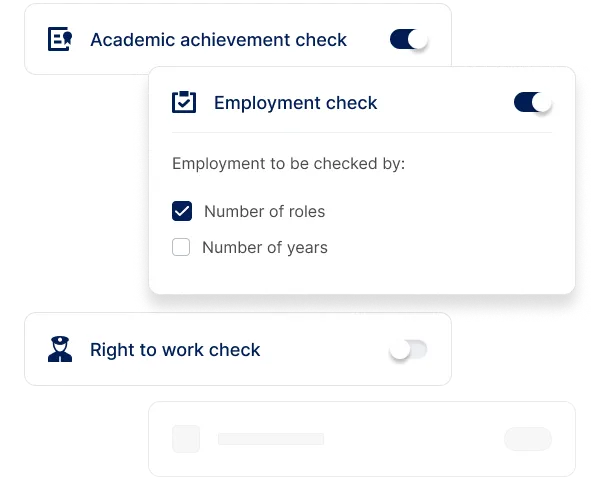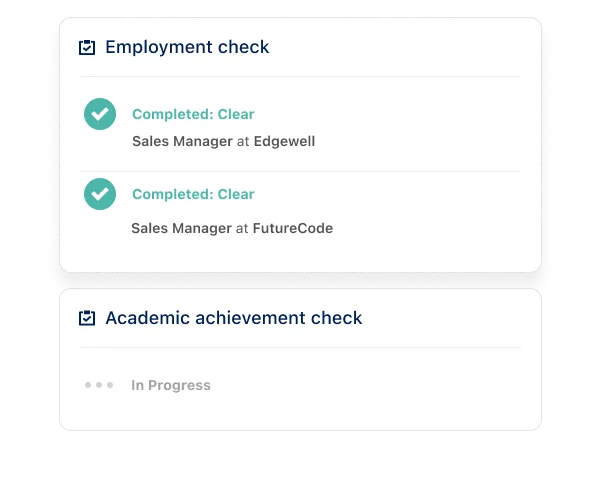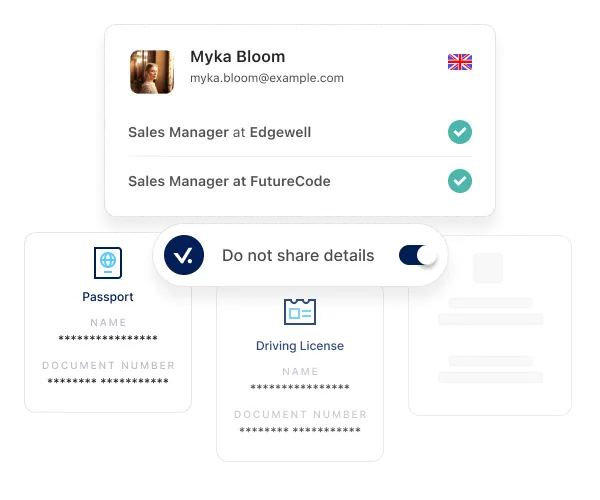Get fast, accurate results on your candidates for a quicker hiring process

Reference checks - get a second opinion on your candidate
A reference check provides key insights into a candidate’s personality, working style, and growth areas. They help employers define, understand and manage potential hiring risks.
But chasing referees can be a time-consuming job. What is an essential part of vetting an individual, can often be overlooked in order to progress the hiring process.
Veremark can save you time and effort by contacting past managers for insights into how candidates perform at work, and for confirmation of skills and professional achievements.
Our reference checks include:
- Strengths and weaknesses
- Professional development areas
- Personality and characteristics, as well as how best to manage and empower them
- Key learning areas
- Contribution to previous employers and their teams
Trusted by the world's best workplaces






PROVEN
.png)
.png)




and Loved by reviewers
Easy
Reduce risk
No lock-in
Global checks
24/7 support
Faster time to hire
With our award-winning software, we’re the number one choice for leading brands and workplaces all over the world.
Reference checks can provide a lot of insight into a candidate - sometimes, much more than a resume can. Previous employers can share their impressions of an individual - their strengths, weaknesses, performance, and skills. It’s a useful second opinion that can strongly influence a hiring decision.
Integrations into your existing HR workflows mean this type of check from Veremark can be combined with other confidential data to assess a candidate’s eligibility to work within the organization.
How it works



Related checks
FAQs
In most cases, companies often call or email references to verify an applicant’s background and experience before making a decision on hiring them.
The most common reasons for employers to call / email references include:
- The employer wants information about the candidate’s specific past performance
- The employer wants to verify that the candidate has a clean record
- The employer wants to see if the candidate was truthful about their skills, education, and work experience
- The employer needs information from previous employers or supervisors in order to make an informed decision on hiring the candidate
Yes, employment reference checks generally work for many reasons. They help employers in hiring the right person by finding out about a candidate’s past work experience, qualifications, education and reduce the risk of potential litigation should the wrong candidate be hired.
There are many ways that the process of employment reference checks can be made more effective and efficient, one way is by using third-party services that verify the information for employers.
Veremark’s digital reference checking can be fully integrated into your applicant tracking system (ATS), and you can include references in candidates Veremark Career Passports, to use and compare data over time.
Referees often feel more comfortable being honest in digital references, knowing that their responses are completely confidential, resulting in deeper insights which can be used to not only make better hiring decisions, but also to tailor onboarding and training for new staff.
Digital technology allows prospective employers to delve much deeper into a candidate’s skills, and foster a better understanding of their communication levels, teamwork, and problem-solving abilities, as well as being faster and more convenient for the referee.
The latest reference checks can be accessed from any mobile device, providing a much more convenient experience for the referee, and resulting in a higher response rate (up to 85%). Digital reference checks can also be carried out in an average turnaround time of 48 hours. As well as speed and convenience, the latest checks also result in richer data which can be proven, tracked, and protected via blockchain.
A lot of employers are not aware of what they can and cannot ask during an employment reference check. Here are some examples of what you shouldn't ask during an employment reference check.
1. Sexual orientation - You cannot ask about the sexual orientation of a candidate during an employment reference check because it is considered discriminatory.
2. Age - You cannot ask about the age of a candidate. Ageism is a form of discrimination.
3. Marital status - You cannot ask about the marital status of an individual, as this is also considered discriminatory.
Additionally, you can’t also ask the date of birth and whether they have children.
Some employers ask for references from former employers, while others want to see references from past co-workers or managers. Some employers also ask for recommendations from previous clients or customers. The most common reference is someone who has worked with the candidate in a professional capacity.
Reference checking is an important part of the hiring process, but it's not just about finding out if someone has worked with someone before or whether they've been recommended by someone else. It's also about making sure that you're hiring somebody who will be a good fit for your company culture and work well with your team members and other employees.
The pre-background checking process has changed massively in recent years, with a wealth of new checks contributing to further insights into candidates, reference checking was one of the earliest background checks, and almost all new employers look to past managers for insights into how candidates perform at work, and for confirmation of skills and professional achievements.
In reference checks, employers usually ask for past work experience, education history and personal references. References can be people who have worked with or known the candidate in the past. They could also be people who have worked with or known someone else who has worked with them.
Background verification checks are conducted in order to verify the accuracy of a candidate’s background information. This can be done by checking their educational qualifications and previous employment experience. On the other hand, reference checks are mostly conducted by employers to verify that a candidate is who they say they are in terms of an assessment of their performance and character. Employers will usually ask the candidate for references and past employers to check if they have been truthful about their past work experience.
Transform your hiring process
Request a discovery session with one of our background screening experts today.






